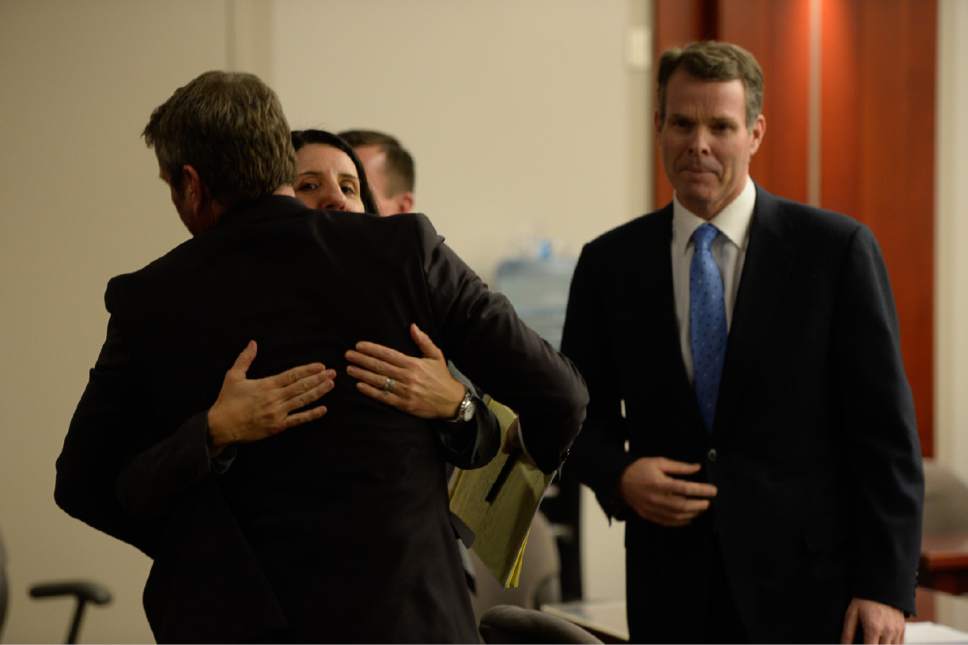This is an archived article that was published on sltrib.com in 2017, and information in the article may be outdated. It is provided only for personal research purposes and may not be reprinted.
"The Committee's investigation revealed that, during his tenure in the Office, Mr. Swallow compromised the principles and integrity of the Office to benefit himself and his political supporters. In so doing, Mr. Swallow breached the public's trust and demeaned the offices he held. Indeed, the Committee concludes that Mr. Swallow hung a veritable 'for sale' sign on the Office door that invited moneyed interests to seek special treatment and favors."
— Report of the Special Investigative Committee, Utah House of Representatives, March 11, 2014
The system worked.
Sort of.
A stream of accusations laid against Utah Attorney General John Swallow were taken seriously by state's political establishment. The Bar Association, the lieutenant governor's office and, most notably and effectively, the House of Representatives launched serious investigations into charges that Swallow was making deals with and accepting favors from people whose activities he should be prosecuting, not sharing.
Even though the probes were led by fellow Republicans in this one-party state, there were no partisan cover-ups. Gov. Gary Herbert said that if Swallow were working for him, he'd have been fired. The House looked into the matter thoroughly and detailed it all in a damning 200-page report.
With all that pressure from the political establishment — and the media — Swallow resigned less than a year after taking office.
At that moment, much was resolved. Utah no longer had an attorney general who himself was under criminal investigation and had been consorting far too freely with others who were, too.
It then became a matter for the criminal justice system. And, after all that time and money, that ended Thursday when a jury returned not guilty verdicts on each of the nine counts that had not already been dropped.
Salt Lake County District Attorney Sim Gill decided that the case against Swallow deserved to be put to a jury.
But the standard for convicting someone of a crime is, and should be, much higher than what is needed for a legislative report. Jurors determined that prosecutors did not meet their burden of proving its case beyond a reasonable doubt, so acquittal was their only option.
Charges that had been filed against Swallow's immediate predecessor and mentor, former Attorney General Mark Shurtleff, had already been dismissed.
In a foreshadowing of Thursday's events, Davis County Attorney Troy Rawlings, who was handling the Shurtleff end of the scandal, had determined that a case built largely on testimony from convicted felons, with key evidence gathered in a federal investigation withheld and with a U.S. Supreme Court ruling that sharply narrowed the kind of behavior that qualifies as bribery, was not worth the effort.
The saddest part of it all seems to be that because some of the key players in the Swallow games were so sleazy, their testimony was either not convincing or, in a case of a witness who feared he would only get into more trouble, not forthcoming.
The lesson for Utah is that the money that candidates for office must chase, in a system that has few limits, is an invitation to behavior that is horribly scandalous but not necessarily criminal. That can seriously damage the public's faith in its institutions but provides no retribution to those who do that damage.
The same House report that condemned Swallow provided a long list of possible improvements to state law. Some of those, including enhanced financial reporting requirements and making it a crime to impede a legislative investigation, were adopted. But the state still lacks effective campaign finance limits and an independent ethics body.
John Swallow today is a free man. The jury has spoken.
The Legislature's work is far from done.



